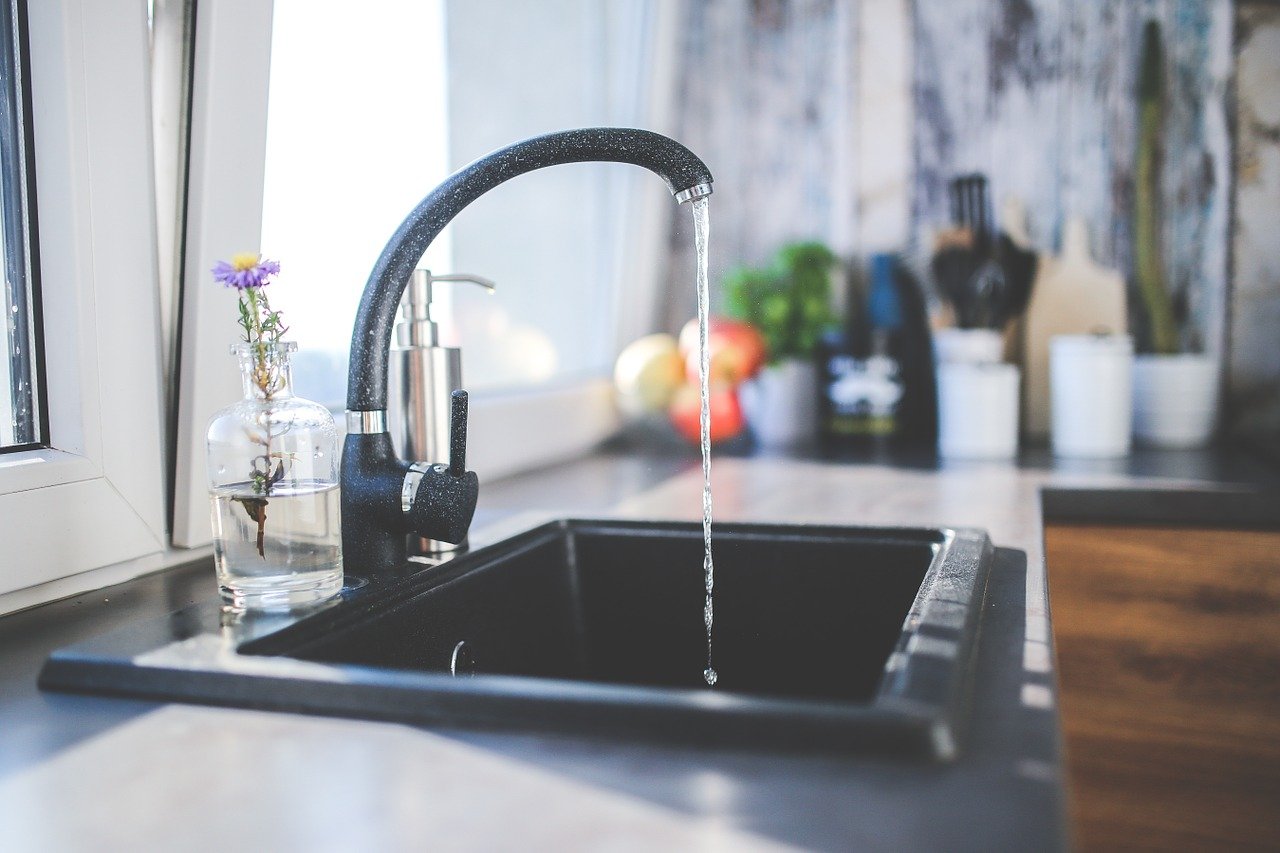Image: kaboompics on Pixabay
In this post we’ll look at some Swahili vocabulary and expressions for an important part of everyday life: jikoni the kitchen. Wewe hupika? Do you cook? No matter how you answer, you probably spend a decent amount of time in the kitchen, so let’s dig in.
Sahani, Vikombe, Uma: Plate, Cups, Forks
Let’s start with the things you use to eat. Of course the basics are: sahani plate, bakuli bowl, kisu knife, kijiko spoon, uma fork, kijiti cha kulia chopsticks, kikombe cup, bilauri, gilasi glass, kitambaa napkin.
- Wapi uma, visu na vijiko?
Where are the forks, knives, and spoons? - Uma, visu na vijiko viko kwa droo.
The forks, knives, and spoons are in the drawer.
- Bilauri safi ziko katika kabineti.
The clean glasses are in the cabinet. - Vikombe vya kahawa viko kwa rafu.
The coffee cups are on the shelf. - Nilivunja bilauri yangu ya mvinyo wa divai.
I broke a wine glass. - Unatumia vijiti vya kulia vya mbao au vya chuma?
Do you use wooden or metal chopsticks? - Naweza pata kitambaa tafadhali?
Could I have a napkin, please? - Una bakuli kubwa za supu?
Do you have bigger bowls for the soup? - Tafadhali weka sahani safi katika kabineti.
Please put the clean plates in the cabinet.
Vifaa vya jikoni.: Kitchen Appliances
Even if you don’t have a lot of gadgets in your kitchen, your probably got most of these: jokofu a refrigerator, jiko a stove/cooker, tanuri an oven, mikrowavu ya tanuri a microwave oven, kibaniko a toaster, sinki a sink, mashine ya kuosha vyombo a dishwasher.
- Maziwa iko kwenye jokofu.
The milk is in the refrigerator. - Funga mlango wa jokofu tafadhali!
Close the refrigerator door please! - Ninapika supu kwa jiko.
I am cooking soup on the stove. - Ninaoka keki na mikate katika tanuri.
I am baking cakes and bread in the oven. - Napasha mabaki katika mikrowevu.
I am heating left-overs in the microwave. - Natengeneza tosti katika kibaniko.
I am making toast in the toaster. - Vyombo vichafu viko kwenye sinki.
The dirty dishes are in the sink. - Nahitaji kuviondoa vyombo kwenye mashine ya kuosha vyombo.
I need to empty the dishwasher.
And depending on where you live and what you like to eat, there’s also: kitengeneza mchele a rice maker, kitengeneza kahawa a coffee maker, birika ya elekroniki an electric kettle, jiko la kupika polepole a slow cooker, kikaango cha hewa an air fryer, mashine ya mkate a bread machine, kitengeneza aisikrimu an ice-cream maker, kikaango cha kina deep fryer.
- Mimi hutumia kitengeneza mchele kila wakati. Sijawai kupika mchele kwa jiko.
I always use a rice maker. I never cook rice on the stove. - Tunahitaji kitengeneza kahawa kipya.
We need a new coffee maker. - Nachemsha maji na birika ya umeme.
I am boiling water with the electric kettle. - Unatumia jiko lako la polepole mara nyingi.
Do you use your slow cooker often? - Vikaango vya hewa huwa havitumii mafuta mengi.
Air friers don’t use a lot of oil. - Natengeneza mkate na kitengeneza mkate.
I make bread in the bread maker. - Nilipata kitengeneza aiskrimu siku yangu ya kuzaliwa.
I got an ice cream maker for my birthday. - Vikaango vya kina hutumia mafuta mengi.
Deep fryers use a lot of oil.
Mbao za kukata na Bakuli za kuchanganya: Cutting boards and Mixing Bowls
No matter how much you cook, you probably have at least a few of these: mbao za kukata a cutting board, seti ya visu a set of knives, bakuli ya kuchanganya a mixing bowl, mwiko a wooden spoon, a ladle, kichakataji cha chakula a food processor, kichanganyio cha umeme an electric mixer, tawa a tawa pan, a wok, karatasi ya kuoka a baking sheet, safuria ya kuoka a baking pan, sufuria ya kukaanga a frying pan, sufuria a pot.
- Nakata mboga kwa mbao ya kukata.
I cut vegetables on a cutting board. - Hakuna nafasi kwa kaunta.
There’s no space on the counter. - Uko na seti ya visu vikali?
Do you have a set of sharp knives? - Ninachanganya viungo kwenye bakuli la kuchanganya.
I mix ingredients in a mixing bowl. - Ninakoroga supu kwa kijiko cha mbao.
I stir soup with a wooden spoon. - Ninatumia mwiko kupakua supu.
I use a ladle to serve soup. - Kichakataji cha chakula ni haraka na rahisi.
Food processors are fast and convenient. - Unatumia kichanganyio cha umeme mara nyingi.
Do you use the electric mixer often? - Kuki ziko kwa karatasi ya kuoka.
The cookies are on the baking sheet. - Ninapika samaki kwa sufuria ya kuoka.
I cook fish in a baking pan. - Ninatumia tawa mara kwa mara.
I use the wok/tawa pan very often. - Napika mayai kwa sufuria ya kukaanga.
I cook eggs in a frying pan. - Uko na sufuria kubwa ya supu?
Do you have a large pot for the soup?
Natengeneza chajio. I’m Making Dinner
If you’re looking for vocabulary and expressions related to cooking, check out this post. And here’s a bunch of food vocabulary that will come in handy when you’re talking about eating or cooking:
- mkate bread
- mchele rice
- pasta pasta.
- tambi noodles
- nyama meat
- kuku chicken
- nyama ya ng’ombe beef
- nyama ya nguruwe pork
- hemu ham
- samaki fish
- nyama ya kondoo lamb
- tofu tofu
- mboga vegetables
- nyanya tomato
- kitunguu onion
- vitunguu saumu garlic
- saladi lettuce
- mchicha spinach
- kabeji cabbage
- uyoga mushroom
- tango cucumber
- pilipili (bell) pepper
- pilipili hoho chili pepper
- tunda fruit
- tufaha apple
- pea pear
- fyulisi peach
- chungwa orange
- limau lemon
- zabibu grape
- straberi strawberry
- ndizi banana
- kokwa nut
- karanga peanut
- mbegu seed
- ngano wheat
- nafaka cereal
- chumvi salt
- pilipili pepper
- ufuta sesame
- asali honey
- sukari sugar
- yai egg
- maziwa milk
- maji water
- chai tea
- kahawa coffee
- mvinyo wine
- bia beer
- maziwa ya soya soy milk
- mchuzi wa soya soy sauce
- jibini cheese
- aisikrimu ice cream
- keki cake
- pai pie
- kuki cookie
- pipi candy
- kula to eat
- kunywa to drink
- kupika to cook
- kuonja to taste
Vyombo, mitungi na mifuko. Containers, Jars, and Bags
Different foods are stored in different types of containers, so may want to say:
- sanduku la pasta/kuki/nafaka
a box of pasta/cookies/cereal - mfuko wa viazi/mboga zilizohifadhiwa
a bag of potatoes/preserved vegetables - chupa ya maji/mvinyo
a bottle of water/wine - katoni ya maziwa/sharubati
a carton of milk/juice - mkebe wa maharagwe/tuna/supu
a can of beans/tuna/soup - mtungi wa mizeituni/kachumbari/vihifadhi vya matunda
a jar of olives/pickles/fruit preserves - chombo cha achali rojo/mayonesi
a container of ketchup/mayonnaise - kifurushi cha kuku/tofu
a package of chicken/tofu
Jikoni ni safi. The kitchen is clean!
Even if you don’t use it much, the kitchen always seems to need cleaning. And there’s a whole set of vocabulary that you can use to talk about that: kifagio a broom, fagio la matamvua a mop, sifonjo a sponge, sabuni ya sahani dish detergent, kitambaa cha sahani a dishtowel, kinyunyuzio cha usafi a spray cleaner, taulo ya karatasi a paper towel, ndoo a bucket, kisafisha sakafu floor cleaner, pipa la takataka trash can/bin.
- Nahitaji kuosha vyombo.
I need to do the dishes. - Tunahitaji kununua sabuni ya sahani.
We need to buy dish detergent. - Natumia sifonjo na kitambaa cha sahani kuosha vyombo.
I am using a sponge and a dishtowel to do the dishes. - Nafagia sakafu kutumia kifagio.
I am sweeping the floor with a broom. - Mimi husafisha sakafu ikichafuka.
I mop the floor when it’s dirty. - Napanguza kaunta kwa taulo ya karatasi na kinyunyuzio cha usafi.
I am wiping the counter with a paper towel and a spray cleaner. - Naweka kisafisha sakafu na maji joto kwa ndoo.
I am putting the floor cleaner and warm water in the bucket. - Nahitaji kutoa takataka nje.
I need to take out the trash. - Takataka inanuka vibaya sana.
The trash smells bad!
Do you want to learn Swahili?
Check out our other posts on Swahili language, culture, and more. And if you’re looking for convenient and affordable live Swahili lessons with a real teacher, check out The Language Garage Swahili. Our lessons are given online in a virtual classroom, so it doesn’t matter where you live or work. We can come to you. And we have flexible options, with a free trial so that you can decide if there’s a fit. Check us out!






